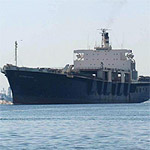 Bloomberg: The U.S. Navy would move to stop any Iranian attempt to lay mines in the Strait of Hormuz or Persian Gulf as an “act of war” the international community wouldn’t tolerate, the U.S. Navy’s top Gulf commander said. Bloomberg
Bloomberg: The U.S. Navy would move to stop any Iranian attempt to lay mines in the Strait of Hormuz or Persian Gulf as an “act of war” the international community wouldn’t tolerate, the U.S. Navy’s top Gulf commander said. Bloomberg
By Tony Capaccio
 The U.S. Navy would move to stop any Iranian attempt to lay mines in the Strait of Hormuz or Persian Gulf as an “act of war” the international community wouldn’t tolerate, the U.S. Navy’s top Gulf commander said.
The U.S. Navy would move to stop any Iranian attempt to lay mines in the Strait of Hormuz or Persian Gulf as an “act of war” the international community wouldn’t tolerate, the U.S. Navy’s top Gulf commander said.
Iran’s inventory of thousands of mines “represents an indiscriminate and very difficult maritime problem,” comparable to the improvised roadside bombs used in Iraq and Afghanistan to kill U.S. troops, Vice Admiral Mark Fox, commander of the U.S. 5th Fleet, told reporters at his Bahrain headquarters and on a conference call today.
Iran’s Vice President Mohammad Reza Rahimi said on Dec. 27 that his nation may close the Strait, the passageway for about one-fifth of globally traded oil, if the U.S. and its allies impose stricter economic sanctions in an effort to halt his country’s nuclear research. U.S. officials, including Pentagon spokesman George Little, have said since that threat that they haven’t seen any Iranian moves to close the waterway.
“The laying of mines in international waters is an act of war,” Fox said today. “We would, under the direction of the national leadership, prevent that from happening. We always have the right and obligation of self-defense and this falls in ‘self-defense.’
‘‘If we did nothing and allowed some’’ mining, ‘‘it would be a long and difficult process to clear them,’’ Fox said.
While Iran says its nuclear program is for civilian use, the U.S. and allies say the country may move to develop nuclear weapons.
Iranian’s Vow
Iran’s Foreign Minister Ali Akbar Salehi told reporters in Tehran yesterday that his country won’t ever cede to international pressure. President Mahmoud Ahmadinejad said he will disclose ‘‘major nuclear accomplishments” in coming days, according to the state-run Press TV news channel.
“The Iranians have every bit as much right to operate in international waters as we do,” Fox said, and “we are very keen on not trying to over-pressurize the situation.”
The Iranian Revolutionary Guard Corps that controls Persian Gulf operations is “capable of striking a blow, I don’t deny that,” Fox said. “The guidance I give the commanding officers of my ships is that ‘you have a right and obligation of self- defense.’ ”
Still, “the oil always flowed,” even in periods of instability such as the “Tanker War” in the 1980s, when ships were attacked and damaged, he said.
Mine-Sweeping Ships
The U.S. has four Avenger-class mine-sweeping ships in the Gulf — the USS Ardent, USS Dextrous, USS Gladiator and USS Scout. The U.K.’s Royal Navy has another four vessels — the HMS Pembroke, HMS Middleton, HMS Quorn and HMS Ramsey, according to the U.S. 5th Fleet in Bahrain.
Mines in the Strait could prompt insurance companies to raise rates on tankers utilizing the waterway, which in turn could lead at least temporarily to higher oil prices.
U.S. officials who follow Iran for the U.S. Central Command estimated in 2008 that Iran possessed as many as 5,000 mines. That compares with 1,000 mines in the 1980s during its conflict with Iraq and the Tanker War.
These include moored mines such as a variant that damaged a frigate, the USS Samuel Roberts, in April 1988 during the Operation Earnest Will escort of Kuwaiti and Saudi tankers.
The inventory also includes as many as 600 advanced mines bought from Russia, such as the MDM-3, which can be dropped from an aircraft. These “influence mines” can be programmed to detonate based on a ship’s acoustic signature.
Caught ‘Red-Handed’
The Navy would detect signs of Iranian mine-laying through surveillance aircraft and sensors, Fox said.
During the Tanker War “we caught some guys red-handed and we stopped them,” he said.
Iran was assessed by U.S. officials in 2008 as having a substantial inventory of mines that could be laid by three Russian-built Kilo-class diesel submarines it bought in the 1990s. In the past 18 months, Iran also increased its inventory of smaller, domestically made Yono-class submarines to more than 10 from 5 previously, Fox said.
The subs are similar to the vessel the U.S. assessed as having sunk the South Korean corvette Cheonan in March 2010, Fox said.
The Yono class is a “lethal but not very capable submarine, he said. ‘‘It doesn’t go very far. It can’t stay submerged very long, but the geography of the Strait of Hormuz is certainly in their favor,” Fox said of the narrow waterway.
The Office of Naval Intelligence also says the Yono-class subs may be used to deploy scuba divers.
Iran has increased the number of small, fast patrol aircraft, some of which have been outfitted with a large warhead for a suicide run at U.S. vessels, Fox said.
It also has boosted the number of coastal-defense cruise missiles along the Strait and invested to make them mobile.
“They have a capability, and we take that capability very seriously and are prepared for it,” Fox said.


